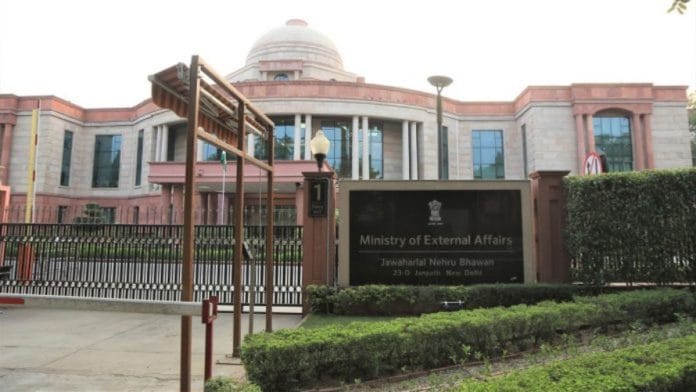New Delhi: The Ministry of External Affairs (MEA) is working on a new law for India’s emigration framework, especially given that over 15 million Indians are now living and working around the world.
“The Ministry submitted that the proposed legislation on Emigration [Overseas Mobility (Facilitation and Welfare) Bill, 2024] seeks to replace the Emigration Act of 1983 with a view to facilitate the circular mobility of people intending to emigrate for overseas employment,” said the Demand for Grants (2024-25) report from the Departmentally Related Standing Committee on External Affairs, which was presented to the Lok Sabha Monday.
The report added: “It (the proposed legislation) aims to establish an enabling framework which will promote safe, orderly and regular migration for overseas employment. The proposed draft is under consultation with line Ministries. After the internal consultations draft will be put up for public Consultation for 15/30 days thereafter it will be followed up by Inter Ministerial Consultations along with the Draft Cabinet Note on revised draft.”
The Committee on External Affairs is chaired by Congress MP Shashi Tharoor, and consists of 31 members–21 from the Lok Sabha and 10 from the Rajya Sabha. The report, laid on the table of the Rajya Sabha on 18 December 2024, looks at the budget and financing of the external affairs ministry in the 2024-25 financial year.
One of the subjects the committee looked at was emigration. According to the Ministry of External Affairs (MEA), there are currently 15.85 million Indians living overseas. Around 15 million of those are working overseas, which include both skilled and unskilled labour.
In recent years, the government has focused on mobility agreements to further ease the processes for Indians to emigrate abroad for work. Currently India has labour mobility pacts with five countries and also Taiwan. They are: Israel, Malaysia, Japan, Portugal and Mauritius.
It has also signed a number of memorandums of understanding on migration and mobility with countries like the UK, France, Germany, Australia, Austria, Italy and Denmark. However, its current legislative framework is the Emigration Act, 1983, a law which has been in force for almost 42 years now.
The MEA has in the recent past twice attempted to overhaul the legislative framework, with a draft Emigration Bill, 2019 and a second attempt in 2021, with another draft bill. The 2021 version of the draft bill was open for public comments between 1 June and 17 July, 2021.
ThePrint takes a look at the Emigration Act, 1983 and the challenges facing India’s current emigration framework.
Also read: MEA provided assistance to 1,871 distressed or abandoned Indian women abroad, highest in Dubai
Emigration Act, 1983
Primarily, the 1983 Act provides a framework for Indian workers entering into contractual employment abroad, while making provisions for their welfare. It created the Protector General of Emigrants (PGE) provision along with Protector of Emigrants (POEs) as the officials in-charge of enforcing the provisions of the Emigration Act.
The focus is on the Emigration Check Required (ECR) countries – specifically the countries which do not have strict laws regarding the entry and employment of foreign nationals. These countries require Indians to receive emigration clearance from the MEA before moving there for work.
There are currently 18 countries on India’s ECR list. They are: Afghanistan, Bahrain, Indonesia, Iraq, Jordan, Kuwait, Lebanon, Libya, Malaysia, Oman, Qatar, Saudi Arabia, South Sudan, Sudan, Syria, Thailand, the United Arab Emirates and Yemen.
However, checks for Libya and Yemen are currently suspended due to the prevailing domestic situation in those specific countries.
There are currently 16 Protector of Emigrants–offices, which aid the PGE in enforcement of the 1983 law. The 16 PoE offices are located in: Mumbai, Chennai, Delhi, Kolkata, Chandigarh, Hyderabad, Cochin, Thiruvananthapuram, Jaipur, Raebareli, Patna, Bengaluru, Guwahati, Ranchi, Bhubaneswar and Agartala.
The main functions of the PGE and POEs are granting emigration clearance to Indians looking to migrate for jobs to any of the 18 aforementioned countries, monitoring the recruitment processes, reporting on illegal recruitment agents and inspecting potential recruiters and their premises.
As per the 1983 law, any recruitment agency requires a certificate from the PGE before they can engage in recruitment activities for overseas companies. The PGE along with the POEs give the final clearance to any application by an Indian for emigration abroad to the 18 ECR countries for the purpose of employment. The e-Migrate portal, which was launched in 2014, has a similar function, by automating the entire emigration process.
The 1983 law was framed in response to a growing number of recruiting agents defrauding Indians and also the exploitation of workers, who were predominantly moving to West Asia at the time.
The Emigration Act, 1983 was enacted with the specific context of the growing migration to the countries in the Gulf, such as the United Arab Emirates, Bahrain, Qatar, Kuwait, Oman and Saudi Arabia.
However in the decades since, Indians have started emigrating to countries across the world for many reasons, including as skilled labour or students. A large number of skilled Indian labour have moved to the developed world, also to the US and Western Europe.
(Edited by Amrtansh Arora)
Also read: Convenient & selective: Jaishankar questions West’s differing standards for Pakistan, Bangladesh






